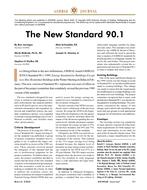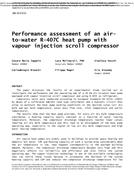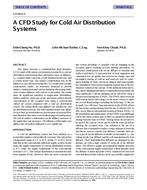Click here to purchase
The residential building stock built before the energy codes were enforced has several significant inefficiency problems in terms of insulation and air leakage. To decrease these inefficiencies, building retrofits are necessary. However, if the envelope is not appropriately designed, excessive accumulation of moisture content and thus mold formation and decay inside the envelope layers can be a vital problem. This risk becomes higher, especially in extreme climate conditions such as cold winters and hot and humid summers as in some northern regions of the U.S. Field studies are essential to test the long-term hygrothermal performance of building envelopes. Although in-situ temperature, RH, and heat flux measurements are straightforward, moisture content measurements are cumbersome. Mainly, because of the heterogeneous nature of the wood materials, deviations and nonuniformities within the materials are unavoidable. Resistance measurements are one of the oldest methods used to measure the moisture content of wood and other building materials. In large-scale studies, it is commonly preferred to use multi-purpose data acquisition systems (DAQ) and custom-made or prefabricated moisture pins to measure the electrical resistance (and thus moisture content) of critical building materials. These multi-purpose DAQ systems generally provide lower costs and offer more flexibility. However, these systems require calibration and fine-tuning to achieve accurate moisture content measurements. A large-scale, two-year-long field study was conducted in northern Minnesota to monitor the hygrothermal performance of residential retrofit wall systems in cold climates. Two base case walls and sixteen different wall treatments were tested.Moisture contents were measured at various layers in each wall treatment using 85 sets of moisture pins. This paper focuses on the overall approach, fabrication, and calibration methodology for the combination of custom-made moisture pins and a multi-purpose DAQ. The aim is to directly use the low-excitation multi-purpose DAQ without any extra voltage regulator. A half-bridge circuit is used to measure wood resistance with 4V excitation voltage and 100 kO and 500 kO reference resistors. The system is calibrated for four different materials: Douglas fir, lodgepole pine, western red cedar, and oriented strand board (OSB). Calibration experiments were done under controlled conditions in 50% and 65% RH test chambers. Resistance-based moisture content calibration curves are obtained for each species. Results show that higher reference resistors provided better calibration curves for lower excitation voltages.
Product Details
- Published:
- 2023
- Number of Pages:
- 9
- Units of Measure:
- Dual
- File Size:
- 1 file , 2.1 MB
- Product Code(s):
- D-AT-23-C078
- Note:
- This product is unavailable in Russia, Belarus


